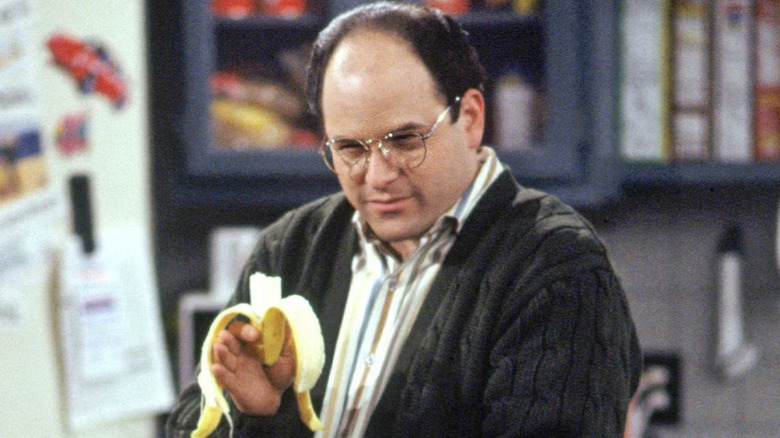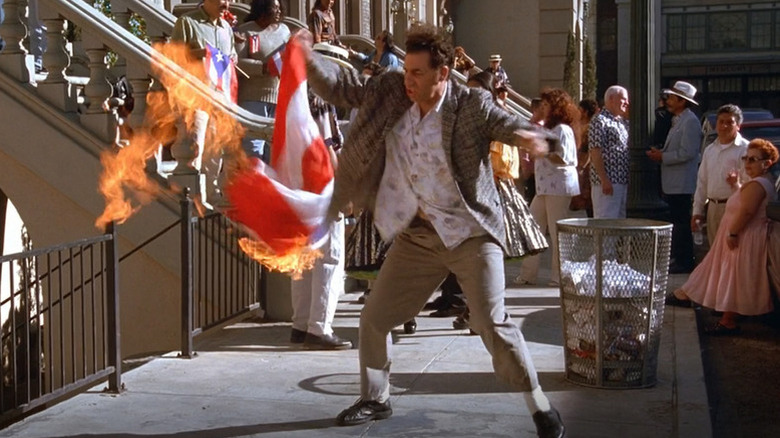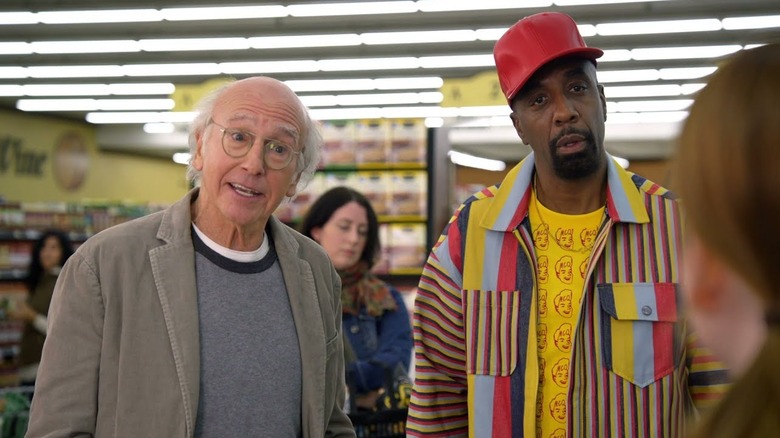A Seinfeld Episode Was So Controversial That NBC Scrapped It
"Seinfeld" went to some pretty dark places over its run. It sent its main characters to prison for a year. It killed off George's (Jason Alexander) fiancé Susan (Heidi Swedberg), and in a very cold manner, I might add. There was even a — decidedly bad — episode where Jerry (Jerry Seinfeld) may or may not have been molested by his dentist. Most sitcoms in the '90s kept things safe and sweet, but Seinfeld, his co-creator Larry David, and the other "Seinfeld" writers had no interest in that sort of thing.
Considering how free "Seinfeld" seemed with pushing boundaries, it's surprising to hear about the moments where the NBC execs decided to draw the line. For instance, there was supposed to be a season 2 episode titled "The Bet" or "The Gun," but it was never filmed because NBC found it way too dark. The episode featured perhaps too much gun-related humor, including a moment where Elaine points a gun to her head and flippantly jokes about the JFK assassination.
Fans can generally understand why NBC cut "The Bet," even if it's fun to imagine a "Seinfeld" episode where the show goes full nihilist. This might be why the fan-written "Seinfeld" script "The Twin Towers" was so popular when it was posted online in 2016. It's a script filled with lots of standard "Seinfeld" tropes and storylines, except it takes place in the immediate aftermath of the 9/11 terror attacks. It's horrendous, but also funny? Let's just say it could never have been a real episode, even if "Seinfeld" had continued into the early 2000s.
What fans struggle to understand, however, is why NBC cut a storyline that didn't seem that edgy, all things considered. The 2017 tell-all book, "Seinfeld Journal of Facts: Official History of Nothing," explained the situation:
"NBC censors pretty much let Jerry Seinfeld and Larry David get away with whatever they wanted on 'Seinfeld.' One of the few exceptions was a proposed episode in which George got in trouble for observing, 'You know, I have never seen a Black person order a salad.' Uh-uh, said NBC. An entire episode on masturbation? Fine by us. But there will no joking about the dietary habits of African-Americans on this show. The script was nixed."
Why did NBC have such a problem with the salad joke?
Fans have speculated a lot over the years about why that proposed George storyline was such a problem. Was it any more uncomfortable than what happened in "The Diplomat's Club," where George keeps trying in vain to prove to his boss that he's not a racist? Then again, that episode came out in season 6, when "Seinfeld" had already become a hit show no longer in danger of premature cancelation. The salad episode was a season 2 script, back when the series was still struggling with viewership and the writers had far less power when dealing with NBC execs.
For fans agreeing with NBC, the primary argument is that "Seinfeld," with its all-white cast and majority-white writing room, were probably best off staying away from that sort of racial humor. "The one taboo that 'Seinfeld' conspicuously didn't take on was race," TV critic David Free wrote in 2010. "Unlike '30 Rock,' the show had no permanent Black cast members. It was therefore poorly positioned to defy America's ultimate no-no."
The show's biggest racial controversy came in season 9's "The Puerto Rican Day," in which Kramer lights a Puerto Rican flag on fire and then tries to stomp the flames out right in the middle of the Puerto Rican Day parade. Kramer lights the flag on fire by accident of course, but good luck explaining that to the crowd.
”We do not feel that the show lends itself to damaging ethnic stereotypes, because the audience for 'Seinfeld' knows the humor is derived from watching the core group of characters get themselves into difficult situations,” NBC said in a statement at the time. "Our appreciation of the broad comedy of 'Seinfeld' does not in any way take away from the respect we have for the Puerto Rican flag.” The episode was subsequently pulled from NBC reruns.
Seinfeld wasn't big on racial humor, but Larry David's next show was
Larry Charles, who penned both the gun and salad episode, has long maintained that cutting them was a mistake by the network. "If it were on 'Louie,' you wouldn't think twice about it," he told ScreenCrush in 2014. "I think 'Louie' has proven and 'Curb Your Enthusiasm' has proven as well that those subjects are worthy of exploration and comedy. I reject the idea that certain subjects should not be touched upon."
Sure enough, David's "Curb Your Enthusiasm" would go on to successfully give us an entire episode joking about stereotypical Black eating habits. In season 11's "The Watermelon," David discovers his Black friend Leon's (J.B. Smoove) biggest secret: he loves eating watermelon, but is too ashamed to eat the fruit in the presence of white people. Larry sympathizes with Leon and encourages him to let go of his shame, resulting in a triumphant scene at the supermarket in which Larry encourages people of all races to eat whatever stereotypical food they'd like.
The episode, written by multiple "Seinfeld" writers, almost seems like a response to the backlash to the proposed salad joke 30 years earlier. When Larry starts talking about Black people eating watermelons in the supermarket, viewers were fully expecting the other customers in the line to get the wrong idea and assume the worst of Larry's comments. Instead, the customers understand exactly what Larry's talking about and are with him 100%. It almost feels like the writers arguing, "See? People are more open to this than you'd think."


